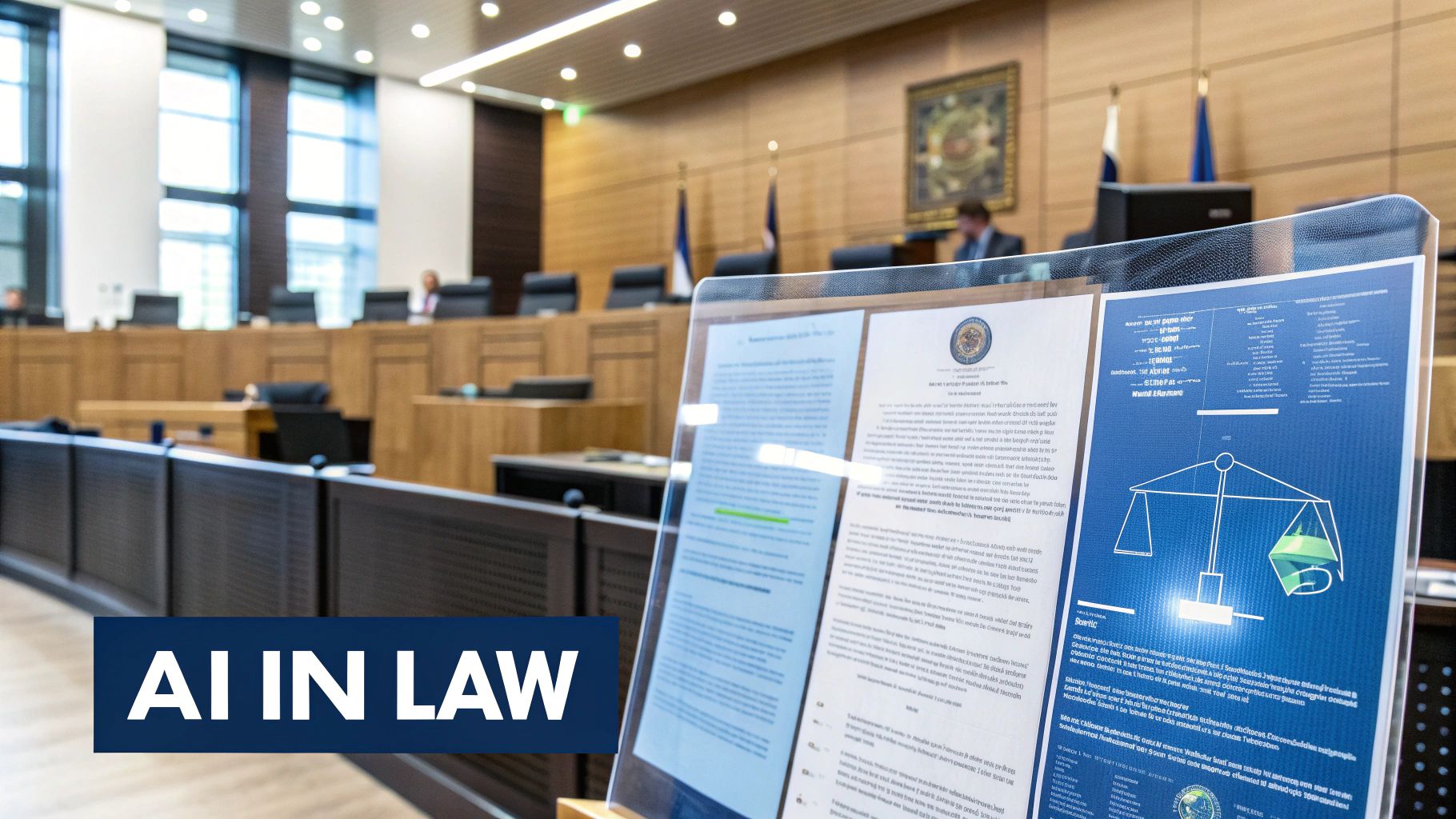Legal Research AI: The Complete Guide to Transforming Your Law Practice
The Evolution of Legal Tech: From Manual Research to AI Innovation

The legal field has come a long way from its traditional research methods. Just a few decades ago, legal research meant spending countless hours in law libraries, meticulously searching through physical books and documents. This manual process, while thorough, significantly limited access to legal information and slowed down research capabilities. The introduction of LexisNexis and Westlaw in the 1970s marked the first major shift by making legal information available in digital format. This digitization set the stage for the next big advancement: AI-powered legal research tools.
The Rise of Digital Databases and Early AI
The switch from print to digital databases made legal research much more efficient by enabling keyword searches and cross-references that weren't possible with physical books. However, these early systems still had limitations - they required specific search terms and Boolean operators, making them complicated to use and often producing overwhelming results. For instance, a basic search could generate thousands of documents that needed manual review. This challenge created an opening for more sophisticated solutions. As the 20th century drew to a close, new tools emerged that could analyze data patterns and predict case outcomes, marking the beginning of AI integration in legal research.
The Power of Natural Language Processing and Predictive Analytics
Natural language processing (NLP) technology brought a significant improvement to legal research tools. Now, legal professionals can search using everyday language instead of complex Boolean queries, making research more accessible and user-friendly. AI-powered predictive analytics also help firms forecast case outcomes and assess risks, leading to more informed legal strategies. This means legal research has evolved beyond just finding information - it now provides strategic insights that shape decision-making and improve client results. The growing importance of these tools is reflected in the numbers: the global legal AI market, valued at USD 1.45 billion in 2024, is expected to grow at a CAGR of 17.3% from 2025 to 2030.
The Future of Legal Research AI
Legal research AI continues to develop at a rapid pace. Future improvements will likely focus on making NLP more accurate, enhancing predictive analytics, and expanding AI applications to areas like contract review and due diligence. The steady growth of the legal AI market shows that law firms increasingly see these tools as essential for improving efficiency and delivering better client service. For legal professionals, staying competitive means embracing these AI research tools as they become standard practice in the field.
Making Legal Research Natural and Intuitive
Legal professionals are finally moving beyond complex Boolean searches and endless document scanning. With AI-powered legal research tools using natural language processing (NLP), lawyers can now search and find information the same way they would ask questions to a colleague. This represents more than just a convenience - it's changing how fundamental legal work gets done.
Understanding the Power of Natural Language Processing
Advanced NLP capabilities enable AI research tools to grasp the nuances of human communication, including context and ambiguity. Rather than constructing elaborate search strings like "contract AND breach AND damages OR remedies," attorneys can simply ask "What are the damages for breach of contract?" This allows them to spend less time wrestling with search syntax and more time analyzing the actual legal substance. It's similar to having a knowledgeable research assistant who understands exactly what you're looking for.
Real-World Applications in Legal Practices
Forward-thinking law firms have already incorporated AI research tools into their daily operations. These systems help quickly surface relevant cases, statutes and regulations, making research far more efficient. The tools can also analyze contracts to identify risks and even predict potential case outcomes with growing precision. This gives lawyers better insights for developing case strategy and achieving optimal client results. The ability to rapidly process and synthesize information is especially valuable during time-sensitive litigation.
Navigating the Learning Curve and Managing the Transition
While AI legal research tools offer clear advantages, adopting new technology requires thoughtful change management. Leading firms address this through comprehensive staff training and support to help lawyers effectively integrate these tools into existing workflows. The focus is on showing how AI enhances rather than replaces human legal expertise. By emphasizing how AI and human judgment work together, firms maintain high standards of accuracy and ethical practice. This measured implementation approach helps realize the full benefits of AI-powered legal research while managing the transition effectively.
Using Predictive Analytics for Better Legal Outcomes

Legal research AI has evolved from basic information retrieval to providing strategic insights for attorneys and law firms. With advances in predictive analytics, legal professionals can now make data-driven decisions about case outcomes, settlement ranges, and legal arguments. These capabilities are reshaping how law firms develop case strategies and advise their clients.
Using Data-Driven Insights to Project Case Outcomes
Legal research AI analyzes historical case law, statutes, and judicial decisions to identify meaningful patterns and trends. By processing this information, these tools can estimate likely outcomes for specific types of cases. For instance, in a personal injury matter, the AI can review similar cases from that jurisdiction to project potential damage awards. This helps attorneys set realistic expectations with clients and build stronger litigation plans based on concrete data rather than just intuition.
Improving Settlement Decisions Through Analytics
Settlement negotiations have also been transformed by legal research AI. By analyzing historical settlement data and case details, predictive models can suggest reasonable settlement ranges. This gives attorneys a clearer picture of case value before entering negotiations. The AI can also study successful settlement agreements to recommend effective language and terms. As a result, firms can negotiate more efficiently and achieve better results for their clients without drawn-out back-and-forth discussions.
Finding Winning Arguments Through AI Analysis
One of the most valuable applications is the ability to identify winning legal arguments. By studying successful cases, AI tools can highlight which points and approaches are most persuasive to judges and juries. This is especially helpful in complex litigation with multiple legal issues at play. The AI can even analyze individual judges' past rulings to understand which arguments they tend to find compelling. These targeted insights help attorneys craft more effective case presentations.
Combining Human Expertise With AI Predictions
While predictive analytics offers powerful capabilities, it works best when paired with experienced legal judgment. Leading firms recognize that AI predictions should inform and enhance attorney decision-making rather than replace it. The future of legal practice lies in this balanced approach - using AI insights alongside professional expertise and critical analysis. This ensures both efficient service and sound legal strategy while maintaining high ethical standards. By thoughtfully integrating both human and machine intelligence, firms can achieve consistently better outcomes for their clients.
Building Your AI-Powered Research Strategy
Modern legal research is being reshaped by advances in predictive analytics and natural language processing. For law firms looking to integrate these tools effectively, a thoughtful implementation strategy is essential. This section examines the key components needed to successfully adopt AI-powered legal research tools, from initial tool selection through measuring results.
Choosing the Right Legal Research AI Tools
Selecting AI tools that match your firm's specific requirements is the critical first step. Each platform has different strengths - some focus on litigation analytics while others specialize in efficient document review. To make the right choice, evaluate factors like your firm's size, practice areas, and current research systems. For instance, intellectual property boutiques may want tools specifically for patent analysis, while full-service firms need broader capabilities. Cost is important but shouldn't be the only factor. Focus on finding tools that deliver the specific features your practice needs at a reasonable price point.
Training Your Team for Success
The success of AI research tools depends heavily on proper training and enthusiastic adoption by your legal team. Invest time in comprehensive training programs that show attorneys how to effectively use these tools and interpret their outputs. Address common concerns by emphasizing that AI assists and enhances legal judgment rather than replacing it. Attorneys must still carefully analyze AI-generated insights and apply their expertise. Since adopting AI often means changing established work patterns, provide ongoing support resources to help your team adapt.
Balancing AI Capabilities With Traditional Expertise
While AI makes legal research more efficient, it works best when combined with traditional legal analysis skills. Think of AI tools as powerful research assistants that complement, rather than substitute for, legal reasoning and judgment. When AI identifies relevant precedents, attorneys still need to carefully examine case details and develop persuasive arguments based on their expertise. This combination of advanced technology and human insight produces the highest quality work. Make sure to maintain appropriate oversight and consider ethical implications as you integrate AI into your practice.
Measuring Success and Demonstrating ROI
New technology investments need to demonstrate clear value. Track specific metrics to measure the impact of AI research tools, such as time saved on research tasks, improvements in prediction accuracy, and client satisfaction levels. Compare how quickly attorneys can find relevant cases using AI versus traditional methods. Evaluate whether AI insights lead to better settlement outcomes or trial results. Hard data on these benefits helps justify the investment and shows the concrete impact on firm performance. This information also guides ongoing refinements to maximize the value of your AI strategy.
Maximizing ROI From Legal Research AI

Getting real value from legal research AI requires more than just having the right tools - it's about using them effectively to improve results. The key is focusing on concrete improvements in speed, accuracy, and client outcomes that directly boost return on investment.
Tracking Key Performance Indicators
Measuring success with legal research AI means tracking specific metrics, not just relying on general impressions. For example, carefully monitor time spent on research before and after implementing AI tools. This helps quantify time savings that translate to increased billable hours or reduced costs. It's also important to measure improvements in research accuracy - when lawyers find more relevant precedents and build stronger arguments, it leads to better case outcomes and happier clients.
Optimizing Your AI Implementation for Maximum Impact
Getting the most from AI requires ongoing fine-tuning, not just initial setup. Make AI tools a natural part of lawyers' daily research workflow rather than treating them as separate systems. This helps ensure high adoption rates and maximum efficiency gains. Regular evaluation of search strategies based on AI feedback enables continuous improvement. The more focused and precise the queries become, the faster lawyers can complete research and deliver results to clients.
Communicating the Value of AI to Clients
When discussing AI with clients, focus on concrete benefits rather than technical details. Show them how AI-powered research helps build stronger cases and gets results faster. Explain that more efficient research can help control overall legal costs. Being transparent about how AI improves service builds trust and strengthens client relationships over time.
Practical Approaches to Cost Management and Efficiency Improvements
Consider legal research AI like a farmer investing in a tractor - the upfront cost pays off through greater productivity. By automating time-consuming document review and case analysis, AI frees lawyers to focus on tasks that need human judgment and expertise. This allows firms to handle more cases effectively with existing resources. When lawyers spend less time on routine research, they can dedicate more energy to strategy and client service. The result is better outcomes, stronger client relationships, and a clear return on the AI investment through improved firm performance.
Future-Proofing Your Legal Practice
Law firms are seeing dramatic changes as artificial intelligence reshapes legal research and practice. Staying competitive requires firms to look beyond just adapting to current AI tools - they need to actively prepare for future developments by building new skills, carefully selecting technologies, and making smart investments.
Essential Skills for the Future Legal Professional
AI-powered legal research tools are changing the skills lawyers need, but not replacing the need for legal expertise. While traditional research methods like Boolean searches may become less critical, lawyers must develop strong analytical abilities to evaluate AI-generated insights effectively. Key skills now include assessing the accuracy and relevance of AI outputs, understanding the capabilities and limitations of different tools, strategic thinking, solving complex problems, and clearly communicating AI-driven findings to clients.
Evaluating and Integrating New Legal Technologies
New AI tools for legal work emerge constantly, making it essential for firms to develop clear processes for assessing these technologies. Important factors include whether tools meet specific practice area needs, integrate well with existing systems, and provide good value for the investment. But purchasing new technology isn't enough - successful adoption requires careful implementation planning, comprehensive staff training, and ongoing support to smoothly incorporate tools into current workflows. Taking a methodical approach to evaluating and implementing new technologies helps firms stay current.
Strategic Investment in AI Capabilities
Making smart investments in legal research AI requires ongoing strategic planning rather than one-time decisions. As the technology evolves, firms should focus investments on tools that support their long-term goals and deliver clear benefits. For example, investing in contract review or due diligence automation can free up lawyers' time for higher-value strategic work. Equally important is investing in training programs so teams can effectively use AI tools and contribute to the firm's success. This balanced investment approach positions firms for sustainable growth.
Maintaining a Competitive Edge in the Age of AI
As legal research AI grows more advanced, how well firms use it will increasingly set them apart. Firms that successfully integrate AI into their practice will be better equipped to serve clients efficiently and deliver high-quality work. This means not just using AI to speed up research, but leveraging its insights to develop creative legal strategies and achieve better outcomes. Forward-thinking firms see AI as a strategic asset for long-term success rather than just an automation tool.
Ready to experience the future of legal document creation and management? Whisperit, an AI dictation and text editing platform, helps legal professionals work more efficiently. Visit https://whisperit.ai today to learn more.